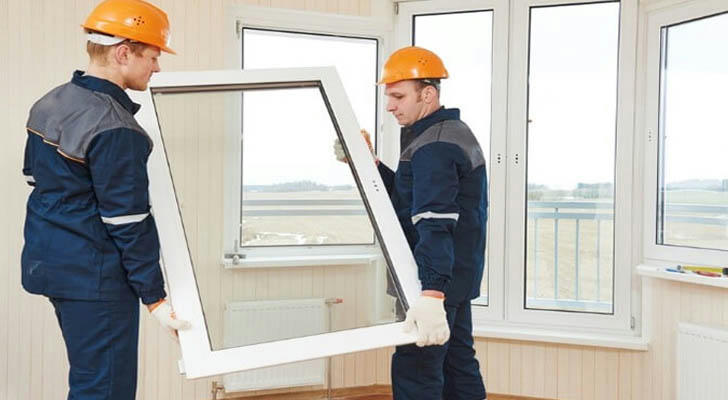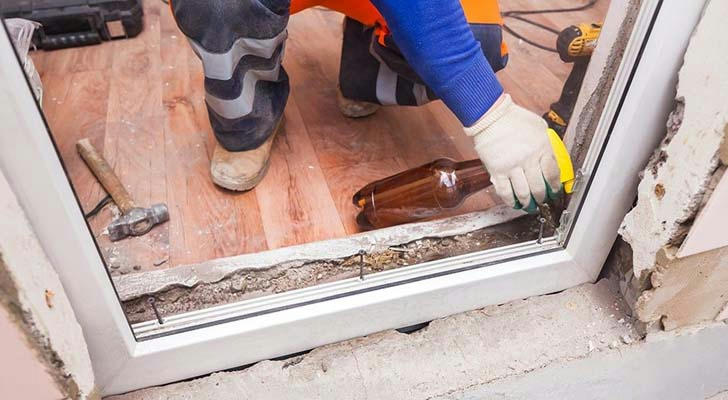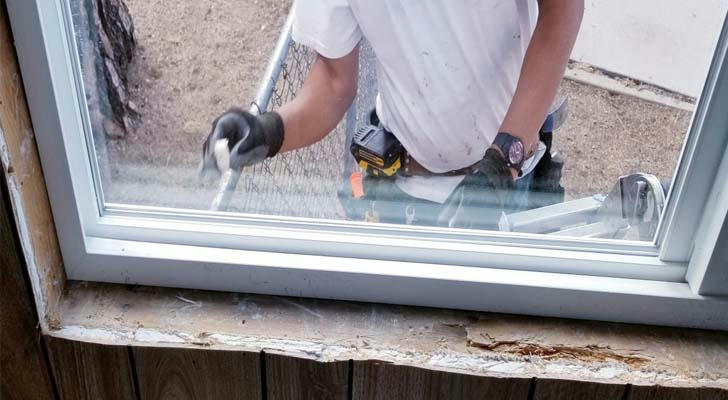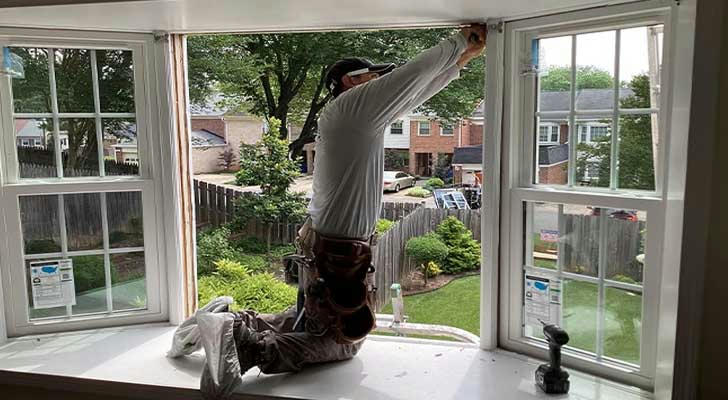Window Replacement vs. Repair: Which Option Is Right for You?

When it comes to maintaining your home, windows are one of the most important features. They help regulate temperature, provide natural light, and keep the elements out. Over time, however, your windows may begin to show signs of wear and tear. If you're dealing with drafts, condensation, or broken glass, you might be wondering whether you should repair or replace your windows. In this article, we’ll help you weigh the pros and cons of both options, so you can make the best decision for your home.
I.Understanding the Difference: Window Repair vs. Replacement
Before diving into the details, let’s first clarify the difference between window repair and replacement.
**Window Repair:**This involves fixing specific issues with your current windows, such as replacing broken panes, sealing leaks, or fixing stuck sashes. Repairing your windows is usually a quicker and more affordable solution if the damage is minor.
**Window Replacement:**This involves completely removing your old windows and installing new ones. Replacement is often necessary if the window frame or structure is damaged, or if the windows are outdated and inefficient.

II.Signs You Need Window Repair
In many cases, repairing your windows can be the best option if the damage is minor. Here are a few signs that your windows might just need a simple repair:
1.Broken or Cracked Glass:
If only one or two panes are cracked or broken, replacing the glass may be a good solution. You can often replace individual panes without replacing the entire window.
2.Drafts or Leaks:
If you notice drafts or leaks around your windows, the issue may be due to weatherstripping or the seals around the window. This can often be fixed by re-sealing the window or replacing weatherstripping.
3.Condensation Between Panes:
If you see moisture between the panes of a double-glazed window, it means the seal has failed. In many cases, this can be repaired by replacing the glass unit rather than the whole window.
4.Sticking Sashes:
If your window sashes are difficult to open or close, the issue may be a problem with the hardware or balance mechanisms. This can often be repaired without replacing the entire window.
III.When to Consider Window Replacement
While repairs can be cost-effective, there are times when replacing your windows is the better long-term solution. Consider window replacement if:
1.Windows Are Old and Inefficient
If your windows are over 20 years old, they may be single-glazed and not energy efficient. Older windows tend to let in drafts, leading to higher energy bills. Modern windows, such as double-glazed or Low-E windows, offer much better insulation, which can help you save money on heating and cooling.
2.The Window Frame Is Damaged:
If the frame of your window is rotting, warping, or severely damaged, it can affect the function and security of the window. Repairing the frame can sometimes be costly, and in many cases, it’s more cost-effective to replace the entire window.
3.Visible Decay or Mold
If the frame of your window is rotting, warping, or severely damaged, it can affect the function and security of the window. Repairing the frame can sometimes be costly, and in many cases, it’s more cost-effective to replace the entire window.
4.Frequent Repairs
If you find yourself constantly repairing your windows due to problems like stuck sashes, broken seals, or cracked glass, it may be time to replace them. Continuously fixing old windows can add up over time, and replacement may ultimately save you money.
IV.Cost Comparison: Repair vs. Replacement
One of the most important factors in deciding between repair and replacement is cost. In general, window repair tends to be less expensive upfront. However, repairs might only provide a short-term fix, especially if your windows are old or inefficient.
1.Window Repair Costs
Depending on the type of repair, costs can range from $100 to $400 per window. For example, fixing a broken glass pane might cost around $150, while sealing drafts or replacing weatherstripping might be as low as $100.
2.Window Replacement Costs
Replacing an entire window, including labor and installation, usually costs between $500 and $1,200 per window, depending on the type of window, materials, and the complexity of installation. High-end windows like custom wooden frames or energy-efficient models may cost even more.
While window repair is less expensive initially, it’s important to consider the long-term value. New windows, though more costly, could save you money on energy bills and increase the value of your home, especially if your current windows are outdated.

VI.How to Save Money on Moving Services: Practical Solutions
How to Save Money on Moving Services
Moving can be expensive, but there are several practical ways to lower your costs. Here are some proven strategies to save money on your move:
1. Book Early
Booking your move in advance is one of the easiest ways to save money. Moving companies often offer discounts for early reservations, especially during the off-peak seasons.
Tip: Book at least 4-6 weeks before your moving date to secure lower rates and avoid last-minute price hikes.
2. Declutter Before You Move
The fewer items you move, the cheaper your move will be. Take time to go through your belongings and get rid of anything you don’t need.
Tip: Sort through your items and sell or donate what you don’t need. Reducing the number of items to move can significantly cut transportation costs.
3. Get Multiple Quotes
Not all moving companies charge the same rates. To find the best deal, request quotes from at least three companies and ask about hidden fees like fuel charges or extra costs for heavy items.
Tip: Use online comparison tools or ask for itemized quotes to avoid unexpected fees.
4. Move During Off-Peak Times
Moving during peak periods like summer or weekends can be more expensive. If possible, move during slower times, like mid-week or in the winter, when prices are lower.
Tip: Schedule your move for a Tuesday or Wednesday in the off-season (November to March) for the best savings.
5. Pack Your Own Boxes
Packing services can add up quickly. Save money by packing your own boxes and materials. Many moving companies charge extra for packing supplies and labor.
Tip: Gather free boxes from local stores or use online platforms like Facebook Marketplace to find free packing materials.
6. Negotiate with Movers
Don’t hesitate to negotiate for a better deal. If you're moving a lot of items or booking multiple services (e.g., storage), ask if they can offer discounts or add-ons like free packing materials.
Tip: Ask if they can waive extra fees or offer a discount for early booking.
7. Look for Promotions
Check for seasonal discounts or special promotions. Some companies offer deals for first-time customers or military families.
Tip: Follow moving companies on social media or sign up for their newsletters to stay informed about limited-time offers.
By following these straightforward tips, you can save money while ensuring a smooth and efficient move. Booking early, decluttering, and packing your own boxes can significantly reduce moving expenses.

VII.Real Example: The Harris Family's Window Decision
To help you better understand the process, let’s take a look at a real example.
The Harris family, who lives in a 30-year-old home in suburban Michigan, noticed that their windows were starting to show signs of wear. They had noticed drafts in the winter, a buildup of condensation between the panes, and a few cracked windows in the living room. After contacting a local contractor, they were presented with two options: repair the existing windows or replace them with new, energy-efficient windows.
Initially, the Harris family considered repairing the windows, thinking it would be a more affordable solution. However, the contractor explained that because the windows were over 20 years old and had outdated single-glazing, repairs would only be temporary. The drafts would continue, and the energy bills would remain high.
The family decided to replace the windows with double-glazed, Low-E windows, which would not only improve energy efficiency but also boost the curb appeal of their home. While the replacement cost them around $8,000 for all their windows, the family expects to save $400 annually on their energy bills. Additionally, the new windows increased the value of their home by around $10,000, making the investment a wise choice.
VIII.Conclusion: Which Option Is Right for You?
Deciding between window repair and replacement depends on your specific needs and the condition of your windows. If the damage is minor, repair might be the best option, especially if you're on a budget. However, if your windows are old, inefficient, or suffering from extensive damage, window replacement could provide better long-term value.
Before making a decision, it's important to get an estimate from a professional window contractor who can assess the condition of your windows and help you weigh the pros and cons of both options. Whether you repair or replace, investing in your windows will improve your home’s comfort, energy efficiency, and overall value.
